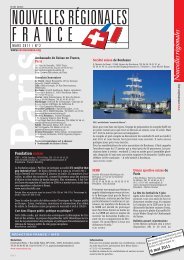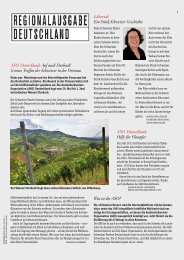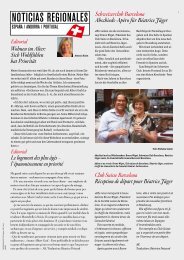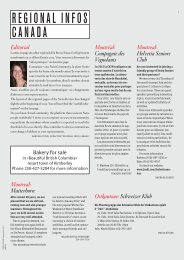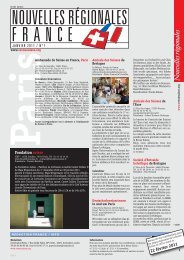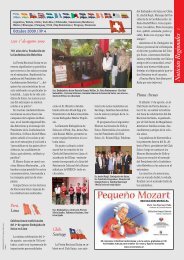Download PDF Swiss Review 6/2012 Low ... - Schweizer Revue
Download PDF Swiss Review 6/2012 Low ... - Schweizer Revue
Download PDF Swiss Review 6/2012 Low ... - Schweizer Revue
Create successful ePaper yourself
Turn your PDF publications into a flip-book with our unique Google optimized e-Paper software.
10 FOCUS<br />
SWISS REVIEW December <strong>2012</strong> / No. 6<br />
Photo: Hans-Rudolf Keusen, Geotest<br />
diversity, for example, because we have<br />
animals and plants that have adapted to<br />
various altitudes. While the climate<br />
changes, the topography does not. Animals<br />
and plants that flourish at a particular<br />
altitude must move into higher regions<br />
provided they are able to do so. Urs Tester,<br />
head of the biotope and species department<br />
at the environmental organisation<br />
Pro Natura, sees bad times ahead for<br />
mountain hares and wood grouse: “Their<br />
potential habitat is growing smaller. We<br />
expect these species will die out in certain<br />
regions.” The OcCC (Organ consultatif<br />
sur les changements climatiques), which<br />
plays an extremely important role in the<br />
climate debate in Switzerland as the expert<br />
committee advising the Federal<br />
Council, has highlighted the position of<br />
the alpine ibex, one of the most magnificent<br />
alpine residents. It too will seek to extend<br />
its habitat into higher and higher locations<br />
provided the mountains are<br />
actually tall enough. If they are not, “local<br />
populations may well break up”, concludes<br />
the OcCC. The prospect of new<br />
species for which Switzerland was previously<br />
too cold resettling in the <strong>Swiss</strong> lowlands<br />
also poses a threat to indigenous species<br />
as it will put them under pressure.<br />
The scientists comment on the anticipated<br />
speed of change in the OcCC reports:<br />
In May 2005, the Stieregg<br />
mountain hut suddenly<br />
found itself teetering on the<br />
edge of a cliff. An enormous<br />
moraine had collapsed because<br />
the <strong>Low</strong>er Grindelwald<br />
Glacier had shrunk massively.<br />
The hut had to be<br />
torn down<br />
“The pace of the migration of foreign species<br />
to Switzerland will increase dramatically<br />
over the next 50 years on account of<br />
the rapid rise in temperatures.”<br />
Water, wind and weather conditions<br />
The model calculations used by the climate<br />
experts focus on the assessable period<br />
up to 2050. They do not concentrate<br />
on a scenario well into the future, but<br />
rather on the climatic conditions that will<br />
shape the lives of the children being born<br />
today when they reach middle age. Switzerland’s<br />
role as “Europe’s water tower”<br />
will also change. Since the glaciers are disappearing<br />
and the snowfall line will rise<br />
by over 300 metres, water levels in the rivers<br />
will fluctuate much more than in the<br />
past. The balancing effect of the gradual<br />
melting of the snow is set to decline because<br />
rain instead of snow will fall more<br />
frequently during the wintertime. This<br />
will result in more frequent flooding during<br />
the winter months, greater water<br />
shortages and dry periods in the summer<br />
and a lower groundwater level. A new competitive<br />
situation will also emerge among<br />
water users. Drinking water plants, hydropower<br />
stations and farmers wanting to water<br />
their crops will rival one another, the<br />
OcCC concludes: “The water supply will<br />
no longer be able to meet the demand ev-<br />
erywhere or at all times.” Tension is also<br />
foreseeable if, of all things, eco-friendly<br />
hydropower stations produce less power<br />
because of water shortages. Power station<br />
operators already want to be able to dam<br />
rivers in protected natural environments<br />
even now, just as they will in the future.<br />
And advocates of nuclear power are taking<br />
advantage of this fact – in spite of Fukushima<br />
– to recommend the construction<br />
of new nuclear power plants. Nuclear<br />
power station operators are nevertheless<br />
aware that rising river temperatures will<br />
also make their lives more difficult. In the<br />
extremely hot summer of 2003, the water<br />
volumes available for reactor cooling were<br />
so low and warm that the output of the nuclear<br />
piles had to be reduced.<br />
As it gets warmer,<br />
the growing season will become longer<br />
A common argument put to those concerned<br />
is that as it gets warmer the growing season<br />
will become longer and a greater harvest will<br />
be produced in some fields. However, this<br />
outlook is flawed in the view of the Chairman<br />
of the <strong>Swiss</strong> Farmers’ Union, Hansjörg<br />
Walter (SVP, TG), who is also the incumbent<br />
President of the National Council.<br />
Walter believes that, besides less certain water<br />
supply, the extreme weather conditions<br />
will have a predominantly negative effect on



